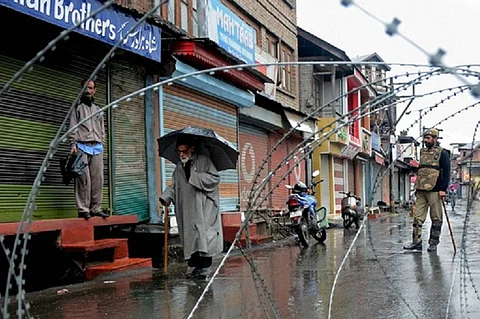

On Women’s day, JNU student union president Kanhaiya Kumar hit the headlines again. This time for his comments on human rights violations and alleged rapes by security forces in Kashmir.
Kanhaiya made the remarks while addressing some students inside the university. In his speech, Kumar said, “No matter how much you try to stop us, we will speak up against human rights violations. We will raise our voice against AFSPA. While we have a lot of respect for our soldiers, we will still talk about the fact that in Kashmir women are raped by security personnel.”
As usual, his comments sent social media into a frenzy. ‘How dare you question the integrity of our armed forces?’ has been the general reaction. But, what Kanhaiya told the gathering is neither a wild allegation nor has he revealed anything new. He merely mentioned what has been discussed in Kashmir for decades now. The horrifying stories of human rights violations and rapes have become a part of life for people in Kashmir.
“There are hundreds of documented cases of sexual violence against security personnel in Kashmir. There could be hundreds more, but not a single soldier has ever been tried for the crimes. There is complete impunity. And the security apparatus of the state has used it to instil fear among people,” says Srinagar-based, human right activist Khurram Parvez.
The allegations of sexual violence against the security forces in Kashmir are grave and need to be looked at seriously.
Twenty-five years on, the victims of Kunan-Poshpora mass rape are still fighting for justice despite systematic denial by the state and unscrupulous investigation trying to prove otherwise. The case is currently pending in the Supreme Court.
On the intervening night of February 23, 1991, 125 personnel of the 4 Rajputana Rifles of the Indian Army cordoned off the twin villages Kunan and Poshpora in north Kashmir’s Kupwara district during an anti-insurgency operation and allegedly gang raped at least 23 women. According to victim’s testimonies, men were segregated from women taken to a barn for interrogation. Then, the women and children were allegedly gang raped —from a 14-year-old girl to a 70-year-old grandmother.
The then Deputy Commissioner of Kupwara, SM Yasin, in his report, had said that the "Army men had behaved like beasts in Kunan Poshpora.”
Over the years, these allegations have been strongly opposed by the Indian Army. In 2014, during the hearing of the case, the army called the statements of victims as stereotyped and “like recorded rotten stereo sounds that play rape all over again.”
For years the case has remained ‘untraced’, meaning that a crime had indeed occurred, though the perpetrators were unable to be identified. The State Human Rights Commission in 2012 recommended a monetary relief to 34 women petitioners and action against officials who closed the case in 1991. In 2014, the high court also directed the government to pay compensation to the victims but the state government challenged the verdict in the Supreme Court.
In 2013, a group of Kashmiri women filed a petition in the high court seeking the reopening of the Kunan Poshpora case. “The state narrative has been a consistent denial of what has happened in Kashmir over the last 25 years,” Essar Batool, a social worker and, one of petitioner in the Kunan-Poshpora rape case.
Today, February 23 is celebrated as Women’s Resistance Day in the valley. What happened in Kunan-Poshpora on that night, twenty-five years ago, still continues to haunt its victims. In fact, it has become the face of state brutality in Kashmir. But it is not the only instance of alleged sexual violence perpetrated by security forces with impunity while operating in the valley.
The twin rape of a 30-year-old woman and her 10-year-old daughter allegedly by a Major of 30 Rashtriya Rifles in Handwara town in North Kashmir is another well-documented case of alleged sexual violence perpetrated by the men in uniform in Kashmir.
On November 7, 2004, a unit of 30 Rashtriya Rifles descended and entered the victim’s house on the pretext of conducting searches. Her husband was forced to wait outside while the victims were allegedly raped. The incident led to widespread protests in the state. After an inquiry, the Major was convicted by court martial, but he later challenged it in the Jammu and Kashmir High Court, which subsequently overturned it.
“When perpetrators of such heinous crimes are let-off time and again without proper trails, it creates an atmosphere of impunity. The state can continue to deny it but it doesn’t change the truth,” adds Parvez.